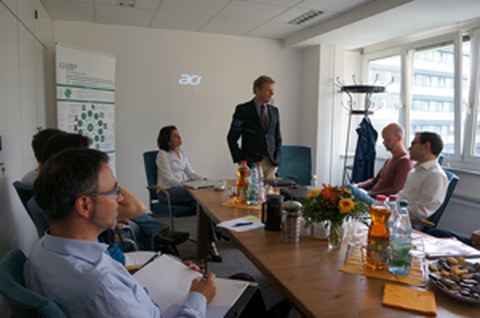Jun 19, 2015
Colloquium with Prof. Brossard
On 19 June 2014 the Boysen-TU Dresden-Graduiertenkolleg (Research Training Group) held a 90-minute colloquium led by Prof. Dominique Brossard (University of Wisconsin-Madison), who is currently a Dresden Senior Fellow at the Institute for Media and Communication at the TU. In attendance were Prof. Wolfgang Donsbach, the doctoral candidates, the coordinator Dr. Anna Martius, Ms. Bauer (assistant) and two TU Dresden project scouts, Dr. Christina Anders and Dr. Udo Krause. After his welcoming remarks, in which Prof. Donsbach gave a brief overview of the founding goals and research aims of the Research Training Group, each participant introduced, in a few sentences, their project or specific role within their project. Afterwards Prof. Brossard spoke about mechanisms of acceptance by the general public and mass media for scientific topics, which she was able to support with examples from her own research which deals with the acceptance of various scientific issues such as nanotechnology, biotechnology and energy. In the animated discussions that followed, national differences in acceptance of different energy technologies and the reasons for these differences were raised. The meeting resulted in the creation of promising contact with the possibility of future collaboration between a single doctoral candidate, the project scouts and the visiting scientist. Prof. Brossard was a Senior Fellow at the Institute for Media and Communication at TU Dresden for one month and held a lecture, open to all students, on the topic of “Risk Communication.” She is the director of the Department of Life Science Communication at the University of Wisconsin-Madison and one of the world’s most well-known scientists in the field of Science and Risk Communication. She has earned in addition to a master’s degree in Plant Biology (Ecole Nationale Supérieure d'Agronomie de Toulouse) a PhD in Communication Science (Cornell University). She specializes in research dealing with the interaction and interdependency of the natural scientific fields of biotechnology, stem cell research, nanotechnology and climate change on the one side, and mass communication on the other. Her work is, therefore, at the intersection between communication science, life science and natural science.

